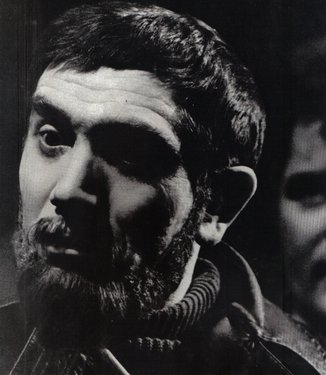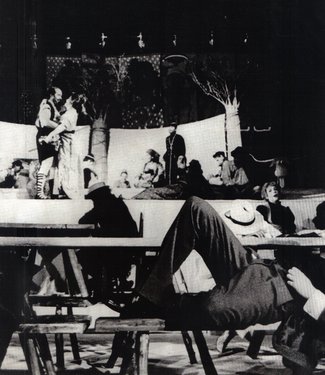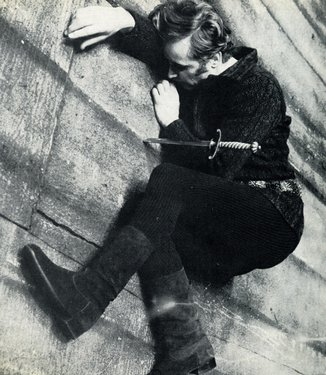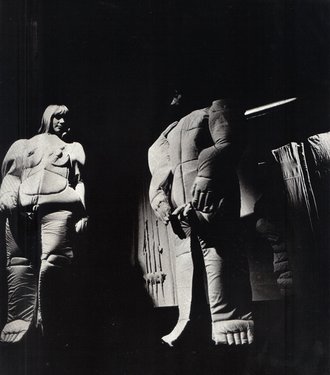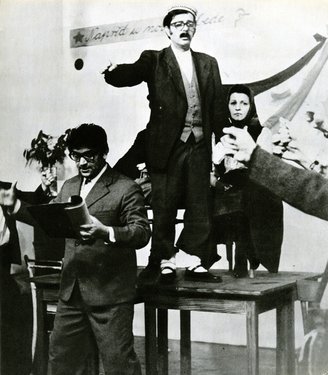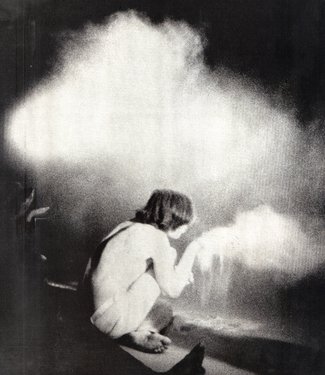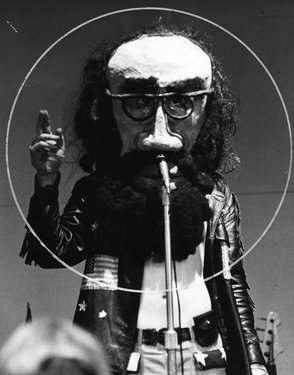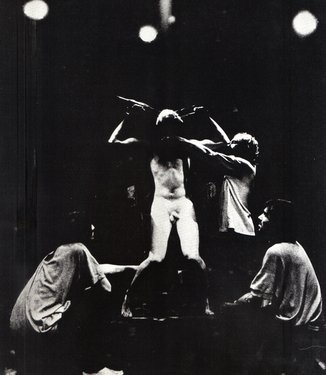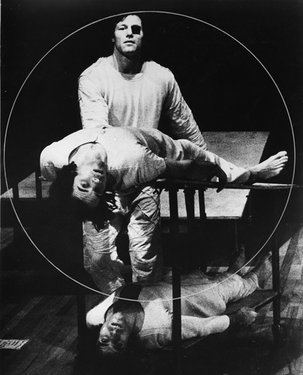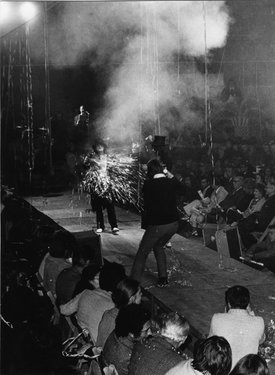
Dizajn / Design: Slobodan Mašić (1939-2016)
BITEF 5
5. BITEF posvećen je slobodnim formama 71. Kao i prošle godine, kada je tema bila Klasika na način 1970, ovogodišnja tema je proistekla iz najboljih predstava novih pozorišnih tendencija u svetu.
Šta su zapravo slobodne forme 71 odgovoriće tek konfrontacija svih predstava u septembru mesecu, kao i susret umetnika sa publikom BITEFA. Ali je već sada očigledno da je slobodni odnos prema pozorišnoj formi karakterističan za većinu predstava 5 BITEFA, i to se manifestuje kao:
Razbijanje formi scenskog prostora
Veliki broj predstava ovogodišnjeg BITEFA prikazuje se izvan scene à l’italienne: na ulici, u garaži, napuštenoj crkvi, starom skloništu, kancelariji socijalističkog saveza, sportskoj dvorani, filmskom studiju.
Razbijanje formi literarnog pozorista
Za razliku od 4. BITEFA kada je većina predstava imala kao osnovu klasične tekstove dramske literature, za ovogodišnji izbor karakterističan je veliki broj predstava u kojima je tekst od drugorazrednog značaja i koji je napisala grupa autora (Veliki čudesni cirkus, Pip Simmons, Pupilija Ferkeverk, Ridikulusi, Theatre du Soleil) ili anonimni pisci.
Razbijanje formi glumačkog izraza
Za većinu predstava 5. BITEFA svojstven je neuobičajeni odnos prema dramskom liku i klasičnom metodu gradenja dramskog karaktera, bilo da lik nema svoju konzistenciju ili da glumac tokom predstave igra niz različitih uloga ili se čak uopšte ne bavi problemom dramskog lika.
lako je u izboru teme 5. BITEFA 71 stavljen naglasak na formu, BITEF je svestan da slobodan odnos prema formi i njeno razbijanje istovremeno znači bavljenje sadržajima i njihovo razvijanje.
Ne želeći da kanonizuje temu strogim izborom i liši publiku dragocenih informacija o nekim značajnim predstavama u svetu, neke predstave 5. BlTEFA ne bi se mogle strogo podvesti pod temu slobodnih formi 1971. godine, ali će sigurno služiti kao dobar kontrast i prilog saznanjima šta se u pojedinim sredinama smatra novim pozorišnim tendencijama.
Jovan Ćirilov
BITEF 5
This year’s BITEF is dedicated to the free forms 71. Like last year, when the theme was The Classics with a 1970 Look, it was not chosen a priori – It resulted from best performances representing new theatrical tendencies in the contemporary world.
What exactly are free forms 71 will be known after the confrontation of all performances in September, and their encounter with BITEF audience. However, it is already obvious that the free treatment of theatrical form
characterizes most performances of fifth BITEF, and is visible as destruction of form:
Of acting space
A great number of this year’s performances at BITEF is to be shown in spaces other than orthodox theatre stage à l’italienne: in the street, a garage, an abandoned church, old air-shelter, Socialist Union meeting room,
sports hall, film studio, etc.
Of literary theatre
As opposed to fourth BITEF when most performances had classical texts of dramatic literature for basis, this year’s performances are characterized by a great number of shows where the text is of secondary importance
and which has been written by a group of authors (Le Grand Magic Circus, Pip Simmons, Pupilija Ferkeverk, The Ridiculous Theatrical Company, Théâtre du Soleil) or anonymous playwrights.
Of acting
Most performances of fifth BITEF have a characteristical attitude to the character and to the classical method of creating the character, whether it has its consistency or the actor plays a series of different roles throughout
the play, or whether it does not at all consider the problem of dramatical character.
Although when choosing the theme of Fifth BITEF 71 the emphasis was on the form, BITEF is aware that free handling of form and its destruction means, at the same time, getting involved into the contents, in order to avoid canonizing the theme of Fifth BITEF by strict choice and depriving the audience of precious information about important performances in the world, some of them could not be strictly classified under the theme of free forms 1971, but will surely serve as a good contrast.
Glavni program / Main Programme
061 Le Grand Magic Circus (Pariz, Francuska); Zartan, nevoljeni brat Tarzanov; režija: Žerom Savari / Le Grand Magic Circus (Paris, France); Zartan, Le frère mal-aimé deTarzan (Zartan, Tarzan‘s Unloved Brother); direction: Jérôme Savary
062 The Open Theatre (Njujork, Sjedinjene Američke Države); Mutacije; režija: Džozef Čajkin (Grand Prix) / The Open Theatre (New York, United States of America); Mutations; direction: Joseph Chaikin (Grand Prix)
063 The Open Theatre (Njujork, Sjedinjene Američke Države); Terminal; režija: Džozef Čajkin (Grand Prix) / The Open Theatre (New York, United States of America); Terminal; direction: Joseph Chaikin (Grand Prix)
064 Théâtre de Poche, Théâtre expérimental de Belgique (Brisel, Belgija); Fernando Arabal: I cveću stavljahu lisice; režija: Lodevajk de Bur / Théâtre de Poche, Théâtre expérimental de Belgique (Brusells, Belgium); Fernando Arrabal: Et ils passèrent les menottes aux fleurs (And They Put Handcuffs on the Flowers); direction: Lodewijk de Boer
065 The Pip Simmons Theatre Group (London, Velika Britanija); Uradi to!; režija: Pip Simons / The Pip Simmons Theatre Group (London, United Kingdom); Do It!; direction: Pip Simmons
066 The Pip Simmons Theatre Group (London, Velika Britanija); Supermen; režija: Pip Simons / The Pip Simmons Theatre Group (London, United Kingdom); Superman; direction: Pip Simmons
067 Teatrul Naţional „Ion Luca Caragiale” (Bukurešt, Rumunija); V. Šekspir: Kralj Lir; režija: Radu Penćulesku / Teatrul Naţional „Ion Luca Caragiale“ (Bucharest, Romania); W. Shakespeare: Regele Lear (King Lear); direction: Radu Penciulescu
068 Gledališče Pupilija Ferkeverk (Ljubljana, Jugoslavija); Pupilija Ferkeverk i Janko Raščupanko; režija: Tomaž Kralj / Gledališče Pupilija Ferkeverk (Ljubljana, Yugoslavia); Pupilija Ferkeverk i Zaspanček Razkodranček; direction: Tomaž Kralj
069 The Ridiculous Theatrical Company (Njujork, Sjedinjene Američke Države); Čarls Ladlam: Plavobradi; režija: Čarls Ladlam / The Ridiculous Theatrical Company (New York, United States of America); Charles Ludlam: Bluebeard; direction: Charles Ludlam
070 Théâtre Laboratorie Vicinal (Brisel, Belgija); Frederik Bal: Valjani valjak; režija: Žan-Pol Ferbis, Frederik Flaman (Grand Prix) / Théâtre Laboratorie Vicinal (Brusells, Belgium); Frédéric Baal: Real Reel; direction: Jean-Paul Ferbus, Frédéric Flamand (Grand Prix)
071 Teatar ITD (Zagreb, Jugoslavija); Ivo Brešan: Predstava Hamleta u selu Mrduša Donja, općine Blatuša; režija: Božidar Violić (Nagrada publike) / ITD Theatre Company (Zagreb, Yugoslavia); Ivo Brešan: Predstava Hamleta u selu Mrduša Donja, općine Blatuša (Performance of Hamlet in the Village Mrduša Donja Municipality Blatuša); direction: Božidar Violić (Audience Award)
072 Atelje 212 (Beograd, Jugoslavija); V. Šekspir: Hamlet u podrumu; režija i adaptacija: Slobodanka Aleksić / Atelje 212, (Belgrade, Yugoslavia); W. Shakespeare: Hamlet u podrumu (Hamlet in the Basement); direction and adaptation: Slobodanka Aleksić
073 Théâtre du Soleil (Pariz, Francuska); 1789; režija: Arijana Mnuškina i ansambl (Grand Prix) / Théâtre du Soleil (Paris, France); 1789; direction: Ariane Mnouckine and Ensemble (Grand Prix)
074 Studio Scarabée (Hag, Holandija); Luseber: Fata Banana; režija: Adri Bon / Studio Scarabée (Hague, Netherlands); Lucebert: Fata Banana; direction: Adri Boon
075 Das Deutsche Theater; Staatstheater der DDR (Berlin, Demokratska Republika Nemačka); Federiko Garsija Lorka: Donja Rosita; režija: Zigfrid Hehst, Horst Zagert / Das Deutsche Theater; Staatstheater der DDR (Berlin, German Democratic Republic); Federico García Lorca: Doña Rosita; direction: Siegfried Höchst, Horst Sagert
076 Tenjo Sajiki (Tokio, Japan); Šuđi Terajama: Jeretici, režija: Šuđi Terajama (Grand Prix) / Tenjo Sajiki (Tokio, Japan); Shuji Terayama: Jashumon (Heresy); direction: Shuji Terayama (Grand Prix)
077 Jugoslovensko dramsko pozorište (Beograd, Jugoslavija); V. Šekspir: Hamlet; režija: Stevo Žigon / Yugoslav Drama Theatre (Belgrade, Yugoslavia); W. Shakespeare: Hamlet; direction: Stevo Žigon
078 Dramsko kazalište „Gavella“ (Zagreb, Jugoslavija); Miroslav Krleža: Kraljevo; režija: Dino Radojević / Gavella Dama Theatre (Zagreb, Yugoslavia); Miroslav Krleža: Kraljevo; direction: Dino Radojević
079 Московский академический театр имени Владимира Маяковского (Moskva, Savez Sovjetskih Socijalističkih Republika); Alesandar Aleksandrovič Fedejev: Poraz; režija: M. A. Zaharov / Moscow Academic Theatre of Vladimir Mayakovsky (Moscow, The Union of Soviet Socialist Republics); Алекса́ндр Алекса́ндрович Фаде́ев (Aleksandr Aleksandrovich Fadeyev): Разгром (The Nineteen); direction: Марк Захаров Анатольевич (Mark Anatolyevich Zakharov)
Your Content Goes Here
